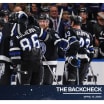First and foremost, the Lightning defended very well. That defensive effort was made possible with excellent puck management (so they limited turnovers and potential counter chances for New Jersey), good neutral zone gaps (so the Devils weren't able to use their speed through center ice), tight checking and effective d-zone clears. On that last topic, the Lightning, when there wasn't a passing play available, were very solid in making sure they chipped pucks safely out of their own end. This limited the amount of time New Jersey spent in the offensive zone.
Of course, having the puck in the New Jersey end was also an essential part of keeping the Devils off the attack. The Lightning's five-on-five play in Game Five was strong - they forechecked tenaciously and buzzed around the offensive zone throughout the game. One of those terrific forechecking sequences led to the opening goal - thanks to pressure applied by Yanni Gourde, Tony Cirelli stole the puck behind the Devils net and set up Mikhail Sergachev at the right point. Sergachev's blast beat a screened Cory Schneider to give the Lightning the lead at 8:07 of the first.
How the power play opportunities unfolded was a storyline in this game, too. After a penalty-free first period, the referees whistled New Jersey for five consecutive penalties in the second period (the final one came at the 20:00 mark, so the Lightning began that power play chance at the start of the third). The Lightning weren't able to score on any of those five power plays. In terms of momentum, that could have potentially worked against them - and for New Jersey. But the Lightning did well during their five chances to generate Grade-A looks and work the puck around the offensive zone. As a result, they didn't cede momentum and forced New Jersey's penalty killers to expend a lot of energy during those power plays. In all, the Lightning finished the game with 13 power play shots - Schneider's magnificent performance kept the Lightning off the board during those power plays. But the Lightning didn't allow the Devils to build any momentum after the string of five power plays ended.
Then there was the play of Andrei Vasilevskiy. As mentioned earlier, the Lightning delivered another strong, all-around defensive performance. But even with that showing, the Devils did generate some scoring chances. Vasilevskiy took care of all of them but one. He did some of his best work in the third period, just before Nikita Kucherov extended the Lightning lead. During New Jersey's lone power play chance in the game, Vasilevskiy made three key saves, including one on a partial breakaway for Kyle Palmieri. Then, after the penalty ended, he denied a good look for Jesper Bratt. Moments later, Kucherov whisted a shot from the center point through a screen and into the net.
Patrick Maroon's tally in this game came during a sixth-attacker situation and cut the Lightning lead to 2-1 with three minutes left. But that was Vasilevskiy's first goal allowed since the 8:23 mark of the first period in Game Four, when Kyle Palmieri netted a five-on-three goal to open the scoring. For Vasilevskiy, that was nearly five and a half periods of shutout hockey.
After their lead was reduced to a goal, the Lightning did well in those final minutes to thwart the Devils attack. Tampa Bay spent much of that time with the puck in the offensive zone. The Devils managed two late shots in the closing seconds - Vasilevskiy made saves on Will Butcher and Travis Zajac - before Ryan McDonagh cleared the puck and Ryan Callahan iced the game and the series with an empty-netter. On to Round Two.
In the coming days, I'll have a full recap of this first round series.
Lightning Radio Big Moment of the Game (as selected by Phil Esposito):
Kucherov's third period goal.
Lightning Radio Three Stars of the Game (as selected by Phil Esposito):



















